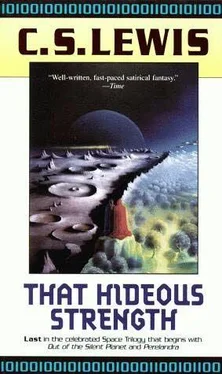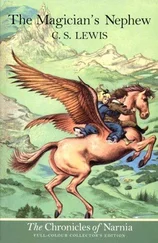Clive Lewis - That Hideous Strength
Здесь есть возможность читать онлайн «Clive Lewis - That Hideous Strength» — ознакомительный отрывок электронной книги совершенно бесплатно, а после прочтения отрывка купить полную версию. В некоторых случаях можно слушать аудио, скачать через торрент в формате fb2 и присутствует краткое содержание. Жанр: Религиоведение, Фэнтези, на английском языке. Описание произведения, (предисловие) а так же отзывы посетителей доступны на портале библиотеки ЛибКат.
- Название:That Hideous Strength
- Автор:
- Жанр:
- Год:неизвестен
- ISBN:нет данных
- Рейтинг книги:5 / 5. Голосов: 1
-
Избранное:Добавить в избранное
- Отзывы:
-
Ваша оценка:
- 100
- 1
- 2
- 3
- 4
- 5
That Hideous Strength: краткое содержание, описание и аннотация
Предлагаем к чтению аннотацию, описание, краткое содержание или предисловие (зависит от того, что написал сам автор книги «That Hideous Strength»). Если вы не нашли необходимую информацию о книге — напишите в комментариях, мы постараемся отыскать её.
That Hideous Strength — читать онлайн ознакомительный отрывок
Ниже представлен текст книги, разбитый по страницам. Система сохранения места последней прочитанной страницы, позволяет с удобством читать онлайн бесплатно книгу «That Hideous Strength», без необходимости каждый раз заново искать на чём Вы остановились. Поставьте закладку, и сможете в любой момент перейти на страницу, на которой закончили чтение.
Интервал:
Закладка:
Mark meanwhile was working at the rehabilitation of Alcasan. He had never seen a police dossier before and found it difficult to understand. In spite of his efforts to conceal his ignorance the Fairy soon discovered it. “I’ll put you onto the Captain,” she said. “He’ll show you the ropes.” That was how Mark came to spend most of his working hours with her second in command, Captain O’Hara, a big white-haired man with a handsome face, talking in what English people called a Southern brogue and Irish people “a Dublin accent you could cut with a knife.” He claimed to be of ancient family and had a seat at Castlemortle. Mark did not really understand his explanations of the dossier, the Q Register, the Sliding File system, and what the Captain called “weeding.” But he was ashamed to confess this and so it came about that the whole selection of facts really remained in O’Hara’s hands and Mark found himself working merely as a writer. He did his best to conceal this from O’Hara and to make it appear that they were really working together: this naturally made it impossible for him to repeat his original protests against being treated as a mere journalist. He had, indeed, a taking style (which had helped his academic career much more than he would have liked to acknowledge) and his journalism was a success. His articles and letters about Alcasan appeared in papers where he would never have had the entree over his own signature: papers read by millions. He could not help feeling a little thrill of pleasurable excitement.
He also confided to Captain O’Hara his minor financial anxieties. When was one paid? And in the meantime he was short of petty cash. He had lost his wallet on his “very first night at Belbury and it had never been recovered. O’Hara roared with laughter. “Sure you can have any money you like by asking the Steward.”
“You mean it’s then deducted from one’s next cheque?” asked Mark.
“Man,” said the Captain, “once you’re in the Institute God bless it, you needn’t bother your head about that. Aren’t we going to take over the whole currency question? It’s we that make money.”
“Do you mean?” gasped Mark and then paused and added, “But they’d come down on you for the lot if you left?”
“What do you want to be talking about leaving for at all?” said O’Hara. “No one leaves the Institute. At least the only one that ever I heard of was old Hingest.”
About this time, Hingest’s inquest came to an end with a verdict of murder by a person or persons unknown. The funeral service was held in the College chapel at Bracton.
It was the third and thickest day of the fog, which was now so dense and white that men’s eyes smarted from looking at it and all distant sounds were annihilated; only the drip from eaves and trees and the shouts of the workmen outside the chapel were audible within the College. Inside the chapel the candles burned with straight flames, each flame the centre of a globe of greasy luminosity, and cast almost no light on the building as a whole: but for the coughing and shuffling of feet one would not have known that the stalls were quite full. Curry, black-suited and blackgowned and looming unnaturally large, went to and fro at the western end of the chapel, whispering and peering, anxious lest the fog might delay the arrival of what he called the Remains, and not unpleasingly conscious of the weight wherewith his responsibility for the whole ceremony pressed upon his shoulders. Curry was very great at College funerals. There was no taint of the undertaker about him; he was the restrained, manly friend, stricken by a heavy blow but still mindful that he was (in some undefined sense) the father of the College and that amid all the spoils of mutability he, at any rate, must not give way. Strangers who had been present on such occasions often said to one another as they drove off, “You could see that sub-warden chap felt it, though he wasn’t going to show it.” There was no hypocrisy in this. Curry was so used to superintending the lives of his colleagues that it came naturally to him to superintend their deaths; and possibly, if he had possessed an analytic mind, he might have discovered in himself a vague feeling that his influence, his power of smoothing paths and pulling suitable wires, could not really quite cease once the breath was out of the body.
The organ began to play and drowned both the coughing within and the harsher noises without-the monotonously ill-tempered voices, the rattle of iron, and the vibrating shocks with which loads were flung from time to time against the chapel wall. But the fog had, as Curry feared, delayed the coffin, and the organist had been playing for half an hour before there came a stir about the door and the family mourners, the black-clad Hingests of both sexes with their ram-rod backs and county faces, began to be ushered into the stalls reserved for them. Then came maces and beadles and censors and the Grand Rector of Edgestow, then, singing, the choir, and finally the coffin-an island of appalling flowers drifting indistinctly through the fog, which seemed to have poured in, thicker, colder, and wetter, with the opening of the door. The service began.
Canon Storey took it. His voice was still beautiful, and there was beauty, too, in his isolation from all that company. He was isolated both by his faith and by his deafness. He felt no qualm about the appropriateness of the words which he read over the corpse of the proud old unbeliever, for he had never suspected his unbelief; and he was wholly unconscious of the strange antiphony between his own voice reading and the other voices from without. Glossop might wince when one of those voices, impossible to ignore in the silence of the chapel, was heard shouting, “Take your bucking great foot out of the light or I’ll let you have the whole lot on top of it “; but Storey, unmoved and unaware, replied, “Thou fool, that which thou sowest is not quickened unless it die.”
“I’ll give you one across your ugly face in a moment see if I don’t,” said the voice again.
“It is sown a natural body; it is raised a spiritual body,” said Storey.
“Disgraceful, disgraceful,” muttered Curry to the Bursar who sat next to him. But some of the junior Fellows saw, as they said, the funny side of it and thought how Feverstone, who had been unable to be present, would enjoy the story.
III
The pleasantest of the rewards which fell to Mark for his obedience was admission to the library. Shortly after his brief intrusion into it on that miserable morning he had discovered that this room, though nominally public, was in practice reserved for what one had learned, at school, to call “bloods” and, at Bracton, “the Progressive Element.” It was on the library hearthrug and during the hours between ten and midnight that the important and confidential talks took place; and that was why, when Feverstone one evening sidled up to Mark in the lounge. and said, “What about a drink in the library?” Mark smiled and agreed and harboured no resentment for the last conversation he had had with Feverstone. If he felt a little contempt of himself for doing so, he repressed and forgot it: that sort of thing was childish and unrealistic.
The circle in the library usually consisted of Feverstone, the Fairy, Filostrato, and-more surprising-Straik. It was balm to Mark’s wounds to find that Steele never appeared there. He had apparently got in beyond, or behind, Steele, as they had promised him he would; all was working according to programme. One person whose frequent appearance in the library he did not understand was the silent man with the pince-nez and the pointed beard, Professor Frost. The Deputy Director-or, as Mark now called him, the D.D. or Old Man-was often there, but in a peculiar mode. He had a habit of drifting in and sauntering about the room, creaking and humming as usual. Sometimes he came up to the circle by the fire and listened and looked on with a vaguely parental expression on his face: but he seldom said anything and he never joined the party. He drifted away again, and then, perhaps, would return about an hour later and once more potter about the empty parts of the room and once more go away. He had never spoken to Mark since the humiliating interview in his study, and Mark learned from the Fairy that he was still out of favour. “The Old Man will thaw in time,” she said. “But I told you he didn’t like people to talk about leaving.”
Читать дальшеИнтервал:
Закладка:
Похожие книги на «That Hideous Strength»
Представляем Вашему вниманию похожие книги на «That Hideous Strength» списком для выбора. Мы отобрали схожую по названию и смыслу литературу в надежде предоставить читателям больше вариантов отыскать новые, интересные, ещё непрочитанные произведения.
Обсуждение, отзывы о книге «That Hideous Strength» и просто собственные мнения читателей. Оставьте ваши комментарии, напишите, что Вы думаете о произведении, его смысле или главных героях. Укажите что конкретно понравилось, а что нет, и почему Вы так считаете.












